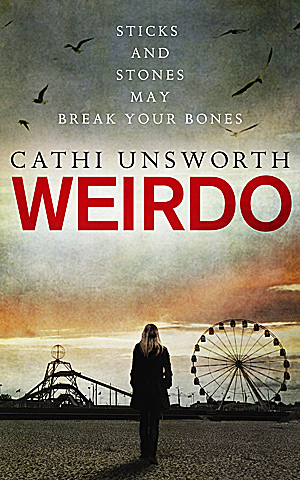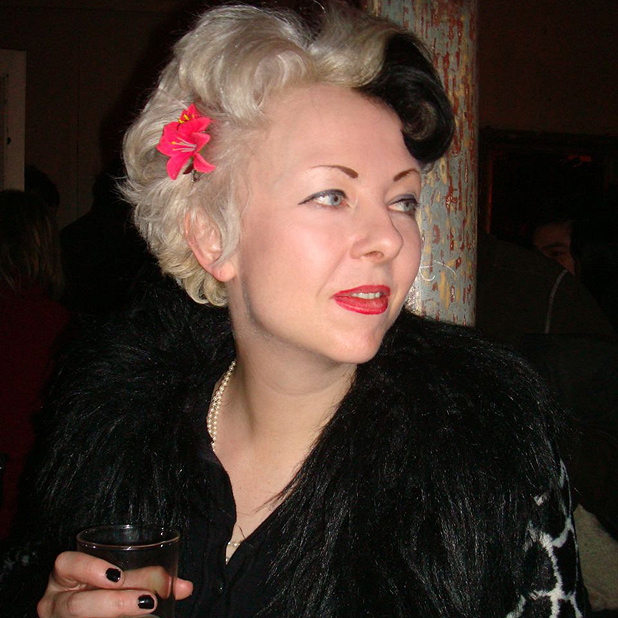Cathi Unsworth began her career writing for the music industry in the good old days, before going on to write a number of critically acclaimed noir novels. As well as working on her books, Cathi writes paperback crime reviews for The Guardian, has appeared on TV and radio including reviewing for BBC2’s The Culture Show. WEIRDO, Cathi’s fourth novel has been tipped a Cult Book of 2012 by STYLIST magazine and is out this month.
London features prominently in much of Cathi’s writing, so who better to guest edit an edition of Run-Riot? Here Cathi shares her love of the capital with us, as well as her thoughts on the evolution of both the music and publishing industries.
Run-Riot: You’ve been called ‘the first lady of Noir fiction’ – were you always a fan of the genre or did it unconsciously become your forte?
Cathi Unsworth: As a child, I loved Sherlock Holmes and the shadows and fog of the Victorian city Conan Doyle brought so mesmerizingly to life. But I didn’t reignite a passion with noir until I met Derek Raymond in 1993, when he was making a record with my friends in Gallon Drunk. Until then I didn’t realise that you could do what he did with a novel. I guess the definition of ‘noir’ as opposed to mainstream crime is that in noir you are looking for the causes of the malaise within society that leads to dreadful acts being committed. It was Raymond’s compassion for the victim in his masterpiece novel ‘I Was Dora Suarez’ that made me want to write the sort of novels he did.
RR: You edited a short story compendium called London Noir- do you find the city a strong source of inspiration for your writing?
CU: Yes, my first three novels all feature Ladbroke Grove, Camden Town and Soho in different timeframes from the 1950s to the 2000s, so you see the same landscapes through those times and the city becomes the central character to the tale. Pyschogeography does work, as I found out when I wrote Bad Penny Blues, which was based on the real unsolved crimes of the so-called Jack the Stripper in 50s/60s. So many references I had put into my first novel The Not Knowing, set in the same places in the early 90s, had incredible resonance to what I discovered researching that earlier period. Sifting the history of London throws up much intrigue, as there are always people written out of contemporary accounts who often turn out to be unsung heroes and heroines. There is enough secret history in London to last several lifetimes!
RR: You started writing for music magazines when you were 19- can you tell us about how different the music industry was back then?
CU: Probably completely. For a start, we wrote on typewriters and had the paper typeset and printed on a Friday morning. Secondly, you just went out there with a tape recorder or a camera and did your thing – you didn’t have to sign a contract with multitude of legal clauses saying you would not discuss this or that, or could only take pictures for a certain length of time. Thirdly, you could just phone people up and they were normally perfectly happy to talk to you – Joe Strummer is a good example, you didn’t have to go through three billion PRs to get him or the majority of his contemporaries, because didn’t have such exalted opinions of themselves – even when they vastly more talented than today’s cossetted young popstrels. They could manage to choose their own clothes as well; there was no industry of stylists telling you how to look. Fourthly, most importantly for a journalist, you owned the copyright to your work, the paper only paid you for the First British Serial Rights and the Union was recognised. Strangely, I think the music industry now is more like that of the early Fifties and Tin Pan Alley, music as a confectionary industry. Only Simon Cowell is Larry Parnes to the power of about three billion as his rights, reach and bank balance extend beyond Larry’s wildest dreams. But that hopefully means the next skiffle boom is right around the corner, off the corporate radar.

RR: Your new book, Weirdo is set in a somewhat sinister Norfolk town- how much of this was drawn on your experience growing up in Norfolk?
CU: Oh, just about all of it! You feel emotions so much more strongly in your teenage years that I don’t think you ever lose those memories. And Gt Yarmouth was a good place to get away from…
RR: How does the writing process work for you- do you lock yourself away for months at a time? Or do you treat it like a regular 9-5 job?
CU: I have a regular 10-6 job four days a week, so I have to be very disciplined. When I am writing I try and do 2 pages a day, every day. It doesn’t always work out, but as a rule of thumb that really is the best way to write a novel when you don’t have much time. Ken Bruen taught it to me and I have followed his advice ever since. I would pass it on to any aspiring writer. When I am not writing I am reading loads of books and watching loads of films to feed into the next story.
RR: Do you own a Kindle or do you prefer ‘real’ books?
CU: I don’t. I am a Luddite – I don’t even have a mobile phone – but I feel something very ominous about Ebooks. While I am all for Do It Yourself, this revolution seems quite similar to me to what Murdoch did at Wapping and could result in hundreds, if not thousands of people losing their jobs, so that large corporations earn even more money for the select few that are setting this agenda. I don’t want the printers, the booksellers, the agents, the second-hand book dealers and everyone else to lose their jobs. They are all there for a reason. It is very difficult to emerge from nowhere as a fully fledged writer – I certainly couldn’t have got this far without my agent or my editor, their moral support and perspective has been crucial. Not to mention the work publishers do in getting the books out there. It would be very difficult – totally a full time job – to do all that on your own.
RR: What book would you take to a desert island?
CU: London The Biography by Peter Ackroyd. Returning to the streets of memory and the city you can never get to the end of, with his beautiful prose, would be a big solace if I was ever estranged from home.
Cathi Unsworth’s new book Weirdo is out now, you can buy it here.
